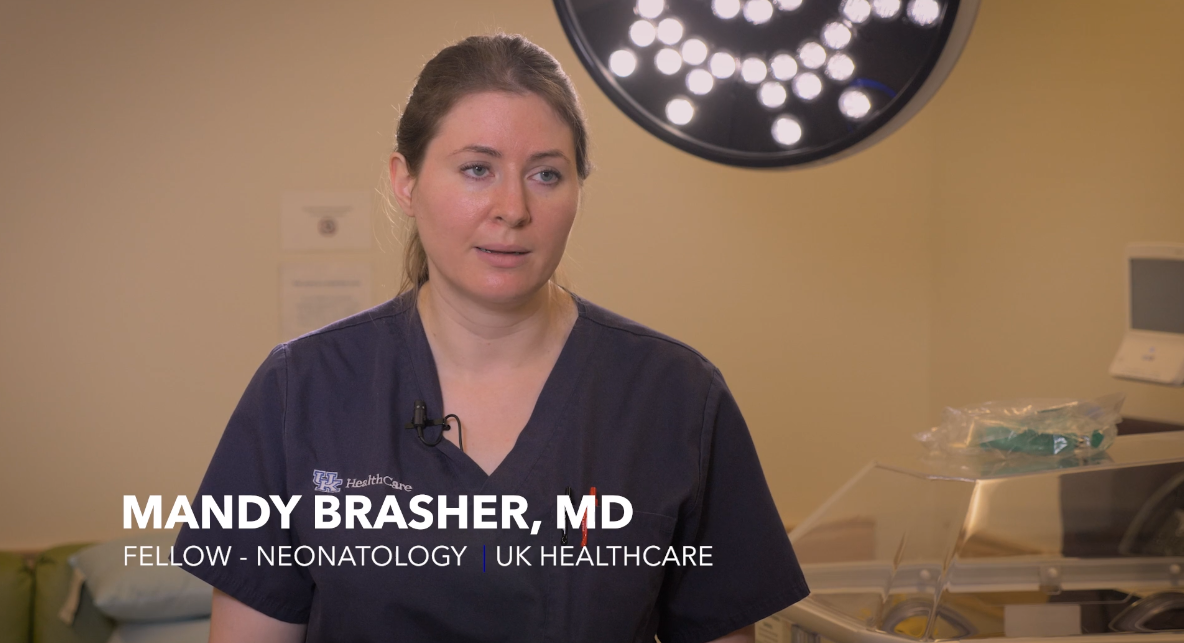Voices from the Front Lines: Mandy Brasher

We recently joined hospital staff for a few days to document the reality of treating COVID-19 patients in UK HealthCare clinical settings.
This edited interview is part of our ongoing series, “UK HealthCare: Voices from the Front Lines,” highlighting stories and perspectives from our frontline staff who have been caring for the sickest COVID-19 patients since March 2020.
Mandy Brasher, MD, is a neonatal and perinatal fellow in the UK HealthCare neonatal intensive care unit (NICU).
Tell us about what you do on a day-to-day basis
My role is training as a subspecialist attending neonatologist … running my NICU team. We take care of two hallways of babies. So, we see a variety of pathology among the babies, some simple breathing problems, sometimes jaundice. And then, a lot of prematurity.
I have a lot of nurse practitioners or PAs who work with direct patient contact, but I am helping make all the medical decisions, coming up with their treatment plans, doing procedures for the infants.
How did things change in the NICU during the most recent COVID surge?
The COVID rate has definitely increased and we are seeing it in the NICU as well. Most of our babies do not contract COVID themselves. However, the social strain on both the infant and the parents has been incredibly severe.
In a lot of situations when the mothers have COVID, we can't allow them to come into the NICU where we have so many incredibly ill and very delicate infants, who would not survive contracting COVID. So, there are situations where we have infants who are here that we're taking care of, and their mothers are unable to visit for weeks.
In other situations that are more severe, we have mothers who are so sick with COVID that they're on a ventilator, a breathing tube. They're unconscious from sedation. And we have to deliver their babies because they're so medically unwell.
What kind of effects can result when pregnant mothers are sick with COVID?
When a baby is still inside (the womb) before it's born, all of its health is relying on the mother's health. So, when a woman is very sick with COVID, on a ventilator needing extra oxygen, her oxygen levels are not good, the infant's levels are also not doing well.
Once the baby is born, especially if this is a woman in the second trimester, the infant's still very premature and that baby is facing all the risks of prematurity – a lot of breathing issues, brain development issues. They're at risk for having bleeding in their brain. They're at risk for having severe intestinal complications as well.
These are situations that can be life-threatening for the infant. We've gotten better on our end for taking care of babies born premature, but we cannot simulate the environment that a mother can offer when she's able to continue her pregnancy in the usual way.
What would you tell a pregnant woman who was hesitant about getting the vaccine?
I would recommend that you get the vaccine. Seeing the situations that we have, where babies are separated from their mothers, mothers die without ever holding their babies. It's just heartbreaking and something I would never wish on anyone. So, I would recommend very strongly to get vaccinated and help protect your family in that way.
What keeps you motivated to come back every day?
I went into this job because I wanted to help people. And of all the people you can help; babies, it's always delightful seeing them get better.
Seeing the baby go home with their parents after a hard course, but knowing we got the baby through it, the baby's doing well now, and the family is going home together. We treat a lot of babies that if there were not NICUs, if we didn't have these medical treatments available, they would die without a doubt.
What’s the one message you want people to understand about COVID and what you see here every day?
If I had to choose one message, it would be to get vaccinated. There's your personal health to worry about, but also there are pregnant women in the community. There are young babies who I've taken care of that have gone out and are trying to live their life but are more delicate in their health that need to be protected.
This is about much more than even protecting yourself. Protecting the others in your community, the babies that we're treating here, the staff here who's also trying to treat babies without compromising their health. That would be my message.




